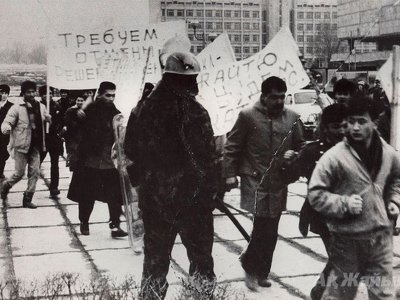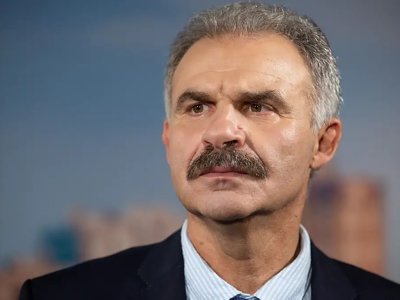Was Kazakh 1986 uprising triggered by Soviet plan to ‘separate’ oil-rich regions?

Known public activist Dos Koshim has alleged that the December 1986 uprising against Soviet rule was triggered by Moscow’s plans to establish direct control over Kazakh oil-rich western regions.
Young Kazakhs took to the streets in Almaty on 17-18 December 1986 following the appointment of ethnic Russian Gennadiy Kolbin as the Kazakh communist party’s new boss. Kolbin replaced the long-serving Dinmukhammed Konayev.
The uprising was violently suppressed by Soviet troops. The number of those killed in the crackdown remains unknown. The participants were labelled ‘nationalists’, allegedly under the influence of drugs and alcohol; 99 were convicted, two of them were given the death penalty.
Koshim, who served as a Kazakh-Russian translator at the trial of four leaders of the uprising, told Exclusive.kz that discontent among Kazakhs with the Kremlin’s policies was high at the time.
“In the 1970-1980s, ethnic Kazakhs, including students from other parts of the republic, made up only 16 percent of Almaty’s population. For the indigenous citizens it was very hard to get official registration in the capital. It was almost impossible for [Kazakh] students to stay in Almaty after graduation.
“On top of that, there was suppression of the language, culture and so on. The dismissal of the Kazakh Konayev and appointment of non-Kazakh Kolbin was the last straw, a spark that ignited the fire,” Koshim said.
However, that is not the whole story, Koshim added.
Koshim said that, as a result of his research, he found out that in 1985 in Guryev, now Atyrau, the Soviet government held a meeting to discuss the idea of creating “an oil region” out of Kazakhstan’s Guryev and Mangistau regions and the Russian Siberian region of Orenburg. The new “oil region” would be under Moscow’s direct control.
He added that a former Guryev regional party official confirmed to him that the meeting had taken place.
According to Koshim, Konayev insisted that the two Kazakh regions should remain part of the Kazakh republic. Nursultan Nazarbayev, who then headed the Kazakh government did not oppose “giving away” the two regions to the Russian republic.
Soon after, Konayev requested retirement, but asked the then Soviet leader Mikhail Gorbachev not to put Nazarbayev in his place, “fearing he would give away the two regions to Russia”.
Hence the Kremlin’s choice of Kolbin, according to Koshim.
“I looked for some confirmation of this version and I think I have found it. In one of his television interviews, Gorbachev said that the Kazakhs themselves had asked him to send [as new Communist boss] someone from outside the republic,” Koshim said.
Koshim then alleged that Nazarbayev, who had ambitions to take over from Konayev, could have been behind the outbreak of the December protests over Kolbin’s appointment.
“He [Nazarbayev] might have thought that the Soviet leadership would be afraid of spilling blood [by putting down the protests] and would remove Kolbin.
“However, the centre went by the old script. They went for a bloody suppression of the uprising to teach everyone a lesson, so no one would dare to dissent. Nazarbayev, as head of the Council of Ministers, was forced to head the operation.
Koshim added that to conceal the death toll from the crackdown, families of those killed had been told their sons or daughters had fallen victim to street crime.
By Merey Sugirbayeva
- Последние
- Популярные
Новости по дням
8 мая 2024







